
Sign in
Don't have an account with us? Sign up using the form below and get some free bonuses!

This is an excerpt from an interview with Dr. Ross Greene, author of The Explosive Child and other phenomenal books for parents and caregivers.
If you'd like to watch our full interview about parenting the explosive child and collaborative parenting, you can do that here:
Hello. I am Sarah with Dandelion Seeds Positive Parenting, and today I am thrilled to be talking with Dr. Ross Greene, author of all sorts of wonderful books, not the least of which is, of course, The Explosive Child.
Also, make sure to check out Raising Human Beings and Lost at School.
Ross, thank you so much for being here today.
My pleasure.
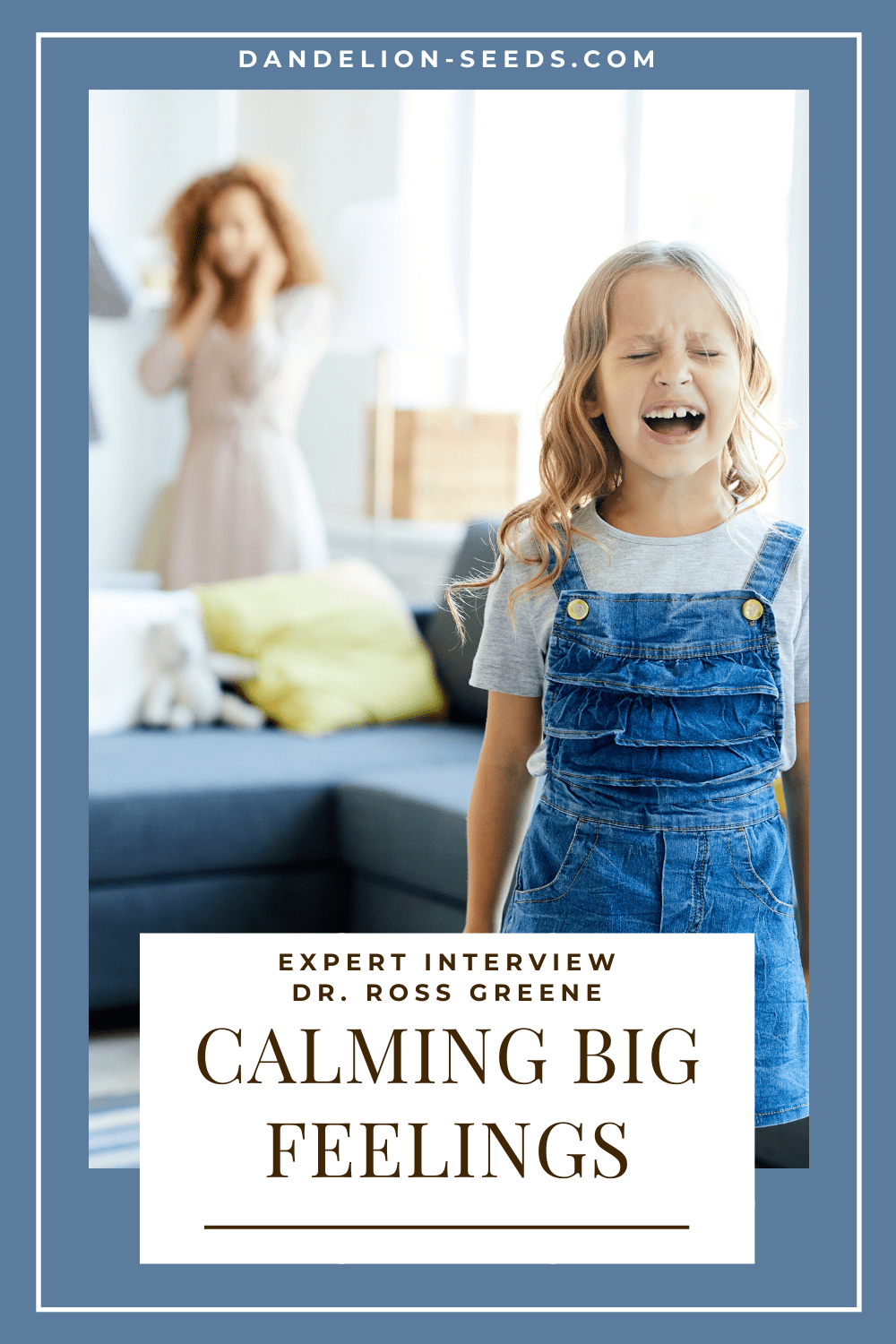
Let's dive right in to discussing the explosive child. As we know, children naturally express big feelings sometimes. It is biologically and developmentally normal.
However, how do we know when we have the explosive child, or an implosive child, or any of the other ways that behavioral challenges can manifest? How do we know when we're dealing with something that is outside the realm of what most parents are dealing with?
Well, it's a very interesting question because it's a bit subjective. And it's not only about what's quote-unquote "normal" in a kid.
It's about what a parent's tolerance is for how their child is reacting to life's problems and frustrations.
I don't worry too much about the explosive child / the implosive child. Those are not real categories.
I worry about, "How is my kid doing? How do I feel my kid is doing? Is my kid responding to life less well than I was hoping they would, maybe by comparison to other kids, or by comparison to my own other kids? Is my kid struggling more than I would like them to be?" - Dr. Ross Greene, The Explosive Child
I would say that those are the questions I'd rather be asking myself as a parent, rather than relying on categories that are kind of artificial.
If you think your kid's doing well, I'm probably going to believe you. If your kid is struggling, I'm probably going to believe you there, too.
That's a really important distinction, and I like how you put the onus on the parent to really know their child. This is not about a textbook definition anywhere. This is about a relationship.
Let's talk about anger, specifically, related to the explosive child. I have heard many times that anger is oftentimes the shield for other emotions. What's really going on when a child expresses anger on a regular basis?
Well, I don't know that I would call it the shield. I would say that it is the
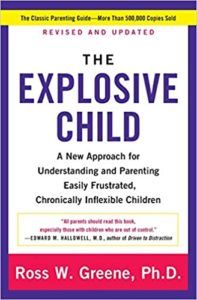
way the kid is communicating something to us. That's very important.
What they're communicating is that there are expectations they're having difficulty meeting. Period.
And that starts to get really interesting because anger is not the only way that a kid can communicate to us that they're having difficulty meeting certain expectations.
Anxiety can be an expression of [a child struggling to meet expectations]. Depression can be an expression of the same thing. Different kids have different ways of communicating to us that there's a certain expectation that they're having difficulty meeting, whether it's something as seemingly benign as difficulty brushing teeth before going to bed at night, or as seemingly grave as difficulty coming in for curfew by midnight.
The bottom line is the way we adults communicate with our kids about our values, our experience, and our wisdom is through our expectations. - Dr. Ross Greene, The Explosive Child
And if a kid is meeting our particular expectation, then we have what's known as compatibility and things are going okay.
But if a kid is not meeting a particular expectation, once again, whether that's related to teeth brushing or some other aspect of hygiene or school work or curfew or who they're hanging out with, now we have what's known as incompatibility. And we have a problem that needs to be solved.
So, I wouldn't call anger a shield because that would make it sound like the kid is saying to us, "Don't come any closer." I think anger is saying to us, "There's an expectation I'm having difficulty meeting," as I said earlier.
You may also like: 3 Ways to Correct the Sensitive Child Without Crushing Their Spirit
That's where it gets complicated because the kid may be having difficulty meeting the expectation because they are just not capable of reliably meeting it at this point.
...Sometimes we adults put expectations on kids that kids aren't even close to being able to meet. Sometimes adults put expectations on kids that we think they should meet but we have no idea why. Those are expectations not worth having. - Dr. Ross Greene, The Explosive Child
So that's where, in my role with families, I'm actually helping parents sort that stuff out. And sometimes the most important question I can ask is, "Why do you have that expectation for your kid?" And if the answer is "I don't know," then I'm frequently saying, "Well, if you don't know why you have that expectation for your kid, then I don't know why you have that expectation."
So life gets interesting when it gets into expectations that we adults have for kids and a kid's capacity to meet that expectation reliably.
What an important shift it is to reframe that, because
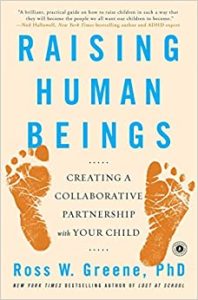
oftentimes it really is about -- be it our inner child or something else that we're processing as an adult -- something that we think "should" be a certain way.
I do air quotes with "should" because we all have so many of the "shoulds." Often, they're not rooted in reality as far as who our child actually is and what they should be doing in our mind's eye.
Correct. And if you ask me, "Ross, in the 2000 families that you've worked with over the last whatever number of years, what have you seen cause conflict most often?" And this applies to schools, as well: putting expectations on kids that we already know cannot reliably meet them.
There's a whole mentality out there that you've got to make the kids stretch. You've got to push the kid -- to the point that it's ruining your relationship with the kid. Now, things are bass-ackwards, right?
You're sacrificing your relationship with your kid because you want them to stretch? I've got ways to help your kids stretch that are not going to sacrifice your relationship along with it. - Dr. Ross Greene, The Explosive Child
That is so important because relationship comes first. Everything else is secondary. I'm so glad that you have that philosophy and that's what you share with parents, because that really is a major shift from what a lot of us come into this parenting role thinking.
We think we're supposed to guide, and push, and what have you -- but just because one kid did something doesn't necessarily mean another child will. They're all individuals.
Correct.
And you know what? Guidance is great if there's compatibility, right? If your kid is responding well to your guidance, you're good to go. If your kid is not responding well to your guidance, you've got a problem to solve.
Exactly. You mentioned two words that make parents' ears perk up -- anxiety and depression -- as those relate to expectations and the explosive child.
Where do we start to see, or where should we start to see red flags? What kinds of things can we be watching out for to know, "Oh, maybe this is an expectations issue versus something else."
Well, I think that would be the first question that I would ask the minute I see my kid having difficulty. My first question is, "How do I understand that difficulty?"
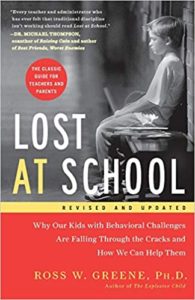
And by the way, in kids, while occasionally the anxiety is general -- anxious about everything -- more often, the anxiety is about specific things. And if the anxiety's about specific things, then that's totally consistent with my model.
It gives us the opportunity to check in with the kid. "I've noticed that you've been having difficulty going to birthday parties that your friends are inviting you to. What's up?" "I've noticed you've been having difficulty sleeping in your own bed at night. What's up?" "I've noticed that you've looked kind of sad lately, especially when you're doing homework that you're struggling with. What's up?"
So the signs -- this is why we don't want to think of anger as a shield -- the sign is kind of an invitation to inquire further. If a kid is globally depressed; globally anxious, that could be something different, but that's actually not most kids.
In most kids, anxiety is more situational a good part of the time. And now we can look at these specific situations in which the kid is looking anxious, nervous, worried, scared, blue, irritable -- and inquire. - Dr. Ross Greene, The Explosive Child
And the beauty of that is you don't have to figure it out all on your own.
Your kid is sending you a signal. Ask.
You do not have to figure it out on your own. Ask.
That is one of the things that I appreciate so very deeply as a parent myself, because back to the concept that this is always about a relationship.
It's not all on us to solve. We are not responsible for "solving" our children. We work with them. We collaborate with them. When we engage in ongoing dialogue -- and that is the key to their hearts, and the key to demystifying a lot of these issues that we see in our daily lives.
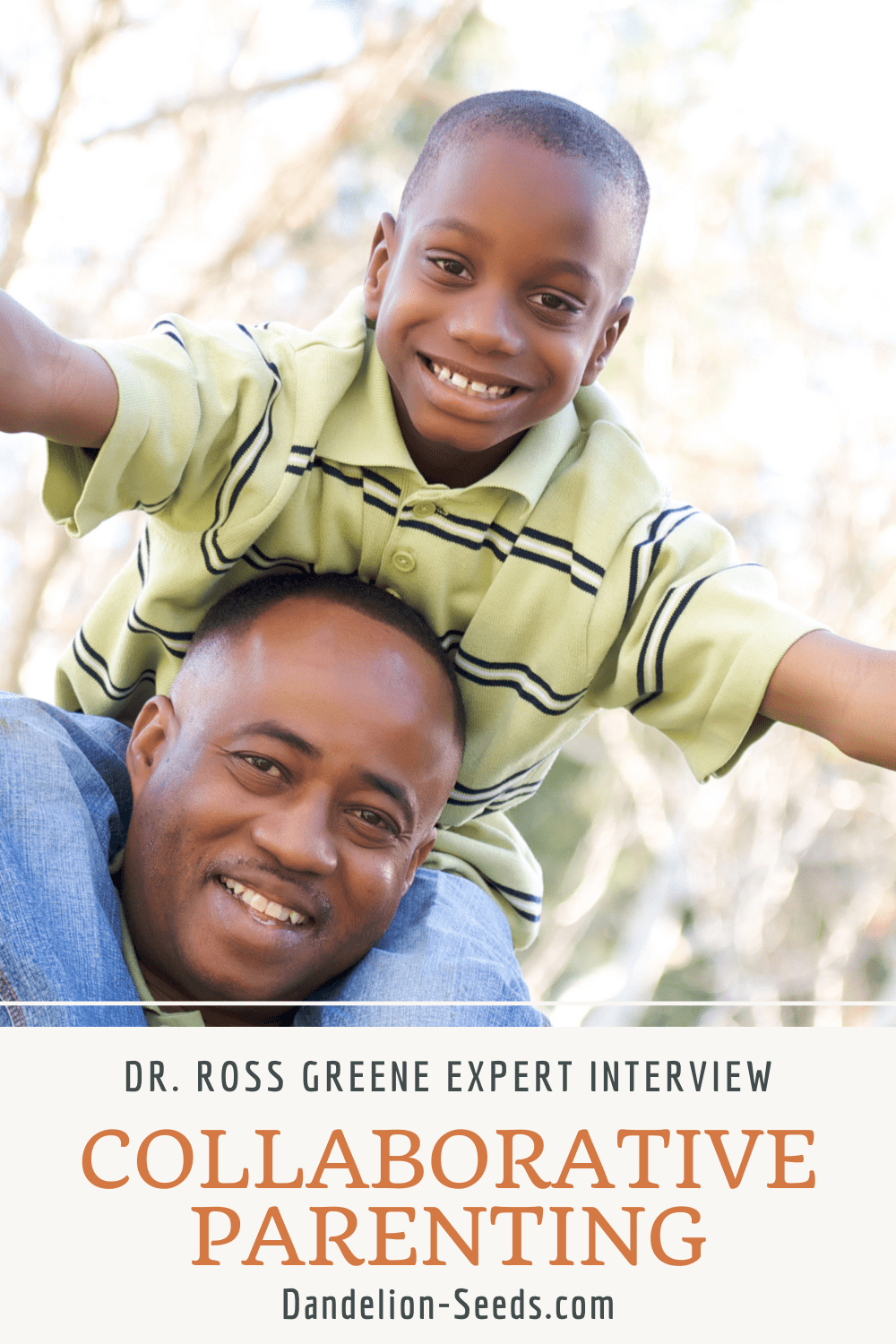
And not only demystifying it for the kid like, "You know what? I can understand you being anxious about that." "I can understand that making you sad."
But also demystifying it for ourselves.
The more we guess [what's going on for our kids without talking to them], the more of a mystery it is. Because we guess wrong a lot. And the more wrong we guess, the more mystified we are about what's really going on. Ask. Demystify it for yourself. Demystify it for your kid. Ask. - Dr. Ross Greene, The Explosive Child
Let's figure out together what's really going on. Parents feel so much pressure to not only figure it out on their own, but to have all the answers at the ready -- it really gets in the way of asking.
This is a really critical point.
Let's talk a little bit about outbursts and the explosive child (or the implosive child). You know, we sometimes have a child who either has a big emotional outburst and it comes out as aggression or in some other way that is suboptimal.
Or, our child implodes and they cry, and all of a sudden, they sink into this pit of emotional despair. But either way, there's been a big "something." Oftentimes, we see that that same child will, for example, go and quickly want to read a book or do something to kind of cover up or hide behind what just happened.
At least on the outside, it appears that they're covering up. Sometimes parents are tempted to look at that as a form as of escapism.
And I would like to help reframing that a little bit. Let's talk about regulation and co-regulation and why sometimes kids might actually need to seemingly shut down a little bit after something like that, before they can re-engage.
And conversely, when is that perceived escapism something to worry about?
That's an interesting question because I like to prove that the expectations that kids are having difficulty meeting are predictable.
And in the CPS model, Collaborative and Proactive Solutions, we use an instrument called the assessment of lagging skills and unsolved problems to help us identify the expectations that a kid is having difficulty meeting.
In many cases, it is the same expectations every day, every week that the child is having trouble meeting. If it's the same expectations every day and every week, and they're not surprising, they're predictable, they can be solved proactively. - Dr. Ross Greene, The Explosive Child
And now, the escapism part doesn't matter so much because if it's a high priority expectation, then we're solving the problem with the kid and the kid isn't going to cry. The kid isn't going to explode. The kid isn't going to implode. The kid isn't going to escape if it's a problem that we've already solved.
The only time those things would come into play is on a problem that isn't solved yet.
With some of the kids that I work with, when we first identify unsolved problems, there are like 40 or 50 of them, right? Because they do tend to stack up when they don't get solved. They stacked up slowly, but surely we're chipping away at the unsolved problems.
And so if I were to see a kid doing something that I might interpret as escapism or something that doesn't really require interpretation, like he's exploding or is imploding, right? My mentality is "Okay, what was that about?"
It wouldn't be over a problem that we solved yet, unless the solution is no longer working. It could only be about a problem that we haven't solved yet or haven't identified yet.
My mentality would be less, "I don't want them to escape" and more "Well, what's the next problem that we need to solve together?" I don't have to worry so much about imploding, exploding or escaping.
What I'm just paying attention to are the expectations my kid's having difficulty meeting. Seldom are they surprising. The only ones that aren't solved yet are the ones we haven't tried to solve yet. Let's get to work. - Dr. Ross Greene, The Explosive Child
I love that you mentioned solutions that aren't working anymore for the explosive child, or the one who handles their big feelings in other ways. Perhaps sometimes we have solved a problem, and as parents, it's tempting to think, "But I already fixed that. Please don't make me fix it again. I don't know what to do this time."
Relationships are dynamic. Our children our dynamic. They are always growing and evolving right before our very eyes, and the challenge for us is to do that alongside them and modify the solutions as the problem manifests differently, correct?
Totally. And along those lines, number one, expectations also evolve, right? We don't have static expectations. The expectations we have for a kid when our kid is three are completely different than the expectations we have for a kid when our kid is seven.
Expectations change. Solutions don't always stand the test of time [with the explosive child or any child]. But most importantly, as a parent, it is not your job to fix anything.
It is your job to collaborate with your kid on solving things. - Dr. Ross Greene of The Explosive Child
And that's not totally on you because so long as it's totally on you, your kid's not going to know how to do it.
Engage your kids in the process of fixing problems with them. If your kid learns that you're the fixer, how's your kid going to learn how to solve the problems that affect his or her life? - Dr. Ross Greene of The Explosive Child
So you're not in the fixing business anymore. You're in the collaborating business.
It's that collaboration with ongoing connection, that is really the only thing that we can reliably turn to whether a child is three or seven or 17 or 77 -- it's really just connection and collaboration no matter what the stage, yes?
Correct.
Now you can connect with your kids over things that are not problems. Like if you can go take your kid to a baseball game and you two are connecting because you're having a good time together. That's connecting.
So I would not say that all connecting is collaborating, but I would say that in my experience, when you're collaborating with your kid, you are definitely connecting.
Many of us who are raising the explosive child, or emotionally sensitive children in general, feel as if we spend a lot of time walking on eggshells, and that is certainly not a place that is empowering for us.
That comes from a place of anxiety and all sorts of other stuff that we don't necessarily want to be perpetuating within the walls of our homes.
So, for the parent who is struggling with "I don't know what to expect next," for our own expectations, how can we help regulate our own nervous systems and parent with confidence -- parent with connection -- not being afraid of the next, "Oops, I upset my child again, and here it's about to get ugly for the next three hours."
Well, it's interesting, because my definition of walking on eggshells has always been that you don't know when your kid's going to get upset next, because you still haven't organized the effort.
This is not criticism, but in when I'm working with parents, it's mostly because we haven't yet figured out what the kid's unsolved problems are.
So we're just waiting for the shoe to drop, right? That's the definition of walking on eggshells.
When you do know what your kid's unsolved problems are, you know when the shoe is going to drop, right? Now, you're not walking on eggshells anymore. - Dr. Ross Greene of The Explosive Child
I find that walking on eggshells is what we say about kids who we still feel are not predictable. But when you're identifying your kid's lagging skills and unsolved problems, your kid is not unpredictable anymore.
Your kid is now very predictable, and not only have you embarked on the process of systematically and incrementally solving those problems, you have a tool solving those problems collaboratively. It is not going to set your kid off, generally speaking. It helps your kid feel a sense of agency.
You're not walking on eggshells anymore. You know exactly what's getting in your kid's way. And the more problems you solve, the less your kid is reacting to those problems in a way that makes you feel like the shoe is about to drop. So, that's what walking on eggshells means to me.
I don't know when it's going to happen again. I just know that it is, but I don't know what it's going to be over.
In this model, you know exactly when your kid's going to get upset again because you've identified that stuff proactively and you're intervening proactively. - Dr. Ross Greene of The Explosive Child
That's precisely one of the things that I do love about your model because it is not fear-based parenting. It is truly collaborative parenting; it is knowing the child, knowing the self as a parent, and figuring out what is this relationship -- so that there are no major surprises here, with the explosive child or any child.
When there aren't major surprises, we don't have to be afraid of any of it.
That's correct.
And that's the beauty. If there is anything beautiful about the fact that the kid is getting upset about pretty much the same stuff every day and every week -- I mean, there's something not beautiful about that -- but there's something beautiful about that and that is that makes your kid very predictable.
Now, some parents listening to this will say, "Everything?"
How about 99%? I will leave room for the 1% that truly surprises you, but the vast majority of things our kid is getting upset about have happened many, many, many times before, right?
He's not eating what you made for dinner. He's not brushing his teeth before he goes to bed at night. He's having difficulty coming in for dinner when you tell them to turn off the Xbox. He's having difficulty waking up for school in the morning.
This is the debris of living with chronically unsolved problems, right?
There's just not that much novelty in what kids are struggling with; and therefore, not much need for walking on eggshells, so long as you're identifying those problems.
View the rest of the interview with Dr. Ross Greene, author of The Explosive Child, here:
Here, you can find more interviews like this one with Dr. Ross Greene, author of The Explosive Child. Also make sure to check out our positive parenting mini-courses.
